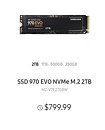Monday, May 7th 2018

Samsung Introduces 970 EVO, PRO SSDs at Lower Pricing Than Previously Announced
Samsung continues to outpace all competition in the SSD market - which it has basically cornered, at least in enthusisasts' minds, when it comes to performance and reliability. In a bid to strengthen their grip, Samsung have decided to introduce their 970 EVO and 970 PRO SSDs with lower pricing than previously announced. This reduced pricing across the entire capacity catalog is sure to bring the heat to other, competing solutions in the market, and make Samsung's options - which now count with a 5 year warranty - all the more appealing.
The new pricing will see Samsung's 970 EVO, for example, going for $109.99 in its 250 GB form; $199 for 500 GB; $399 for its 1 TB capacity; and $799 in its ultimate, 2 TB form. These prices place it in an extremely competitive light with Intel's 760p, for example ($116.25, $215.45, $399.99 and $1730.01, respectively) and WD's in-house WD Black ($119.99, $234.24 and $449.99 for the 1 TB version). The 970 PRO, the best-performing SSD, will apparently be available from $249.99 (500 GB) and $499.99 (1 TB). Samsung essentially lowered pricing against its previous generation 960 EVO and 960 PRO, while delivering (virtually) across-the-board improvements.
Sources:
Samsung, via AnandTech
The new pricing will see Samsung's 970 EVO, for example, going for $109.99 in its 250 GB form; $199 for 500 GB; $399 for its 1 TB capacity; and $799 in its ultimate, 2 TB form. These prices place it in an extremely competitive light with Intel's 760p, for example ($116.25, $215.45, $399.99 and $1730.01, respectively) and WD's in-house WD Black ($119.99, $234.24 and $449.99 for the 1 TB version). The 970 PRO, the best-performing SSD, will apparently be available from $249.99 (500 GB) and $499.99 (1 TB). Samsung essentially lowered pricing against its previous generation 960 EVO and 960 PRO, while delivering (virtually) across-the-board improvements.




31 Comments on Samsung Introduces 970 EVO, PRO SSDs at Lower Pricing Than Previously Announced
Feels strange to talk about SATA as if it were an ancient technology...
For people who have the need then yeah, get a fast NVMe and several high capacity HDD in redundancy array would be better. Personally I love high capacity HDD. Can't wait until the multi actuator HDD comes out and finally breaks the 500MB barrier of SATA